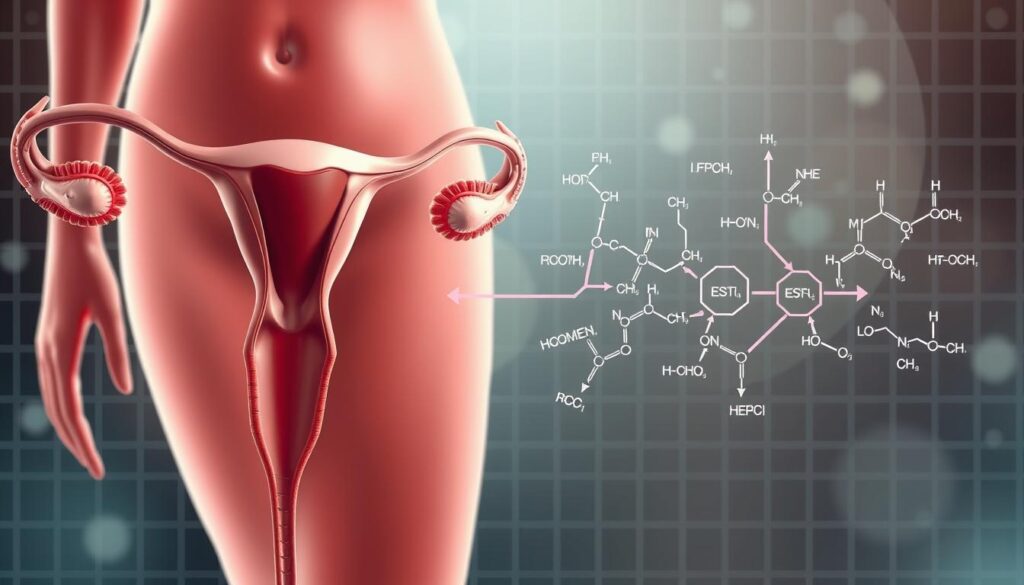Millions of women worldwide experience hormonal imbalances, with estrogen dominance being a common issue that affects overall health and wellbeing. Estrogen balance is crucial for maintaining a healthy reproductive system, bone density, and even mental health.
An imbalance can lead to a range of symptoms, including mood swings, weight gain, and fatigue. Fortunately, there are several effective methods to restore balance without resorting to pharmaceuticals.
Understanding the importance of estrogen balance and adopting natural approaches can significantly improve quality of life. This article explores various strategies for achieving hormonal harmony.
Key Takeaways
- Understanding the importance of estrogen balance for overall health.
- Recognizing the symptoms of estrogen imbalance.
- Exploring natural methods to achieve hormonal balance.
- The role of diet and lifestyle in maintaining estrogen balance.
- Effective natural strategies for restoring hormonal harmony.
Understanding Estrogen and Hormonal Balance
Achieving hormonal balance is crucial for overall health, and understanding estrogen’s role is the first step. Estrogen is a vital hormone that influences various bodily functions, from reproductive processes to bone health.
What is Estrogen and Its Role in the Body
Estrogen is a category of hormones that includes estrone, estradiol, and estriol. Estradiol is the most potent and prevalent form of estrogen in premenopausal women, playing a crucial role in regulating the menstrual cycle and maintaining reproductive health. Beyond reproductive functions, estrogen influences other bodily systems, including the skeletal, cardiovascular, and nervous systems. For instance, estrogen helps maintain bone density, which is why postmenopausal women are at a higher risk of osteoporosis due to decreased estrogen levels.

Signs and Symptoms of Estrogen Imbalance
Estrogen imbalance can manifest in various ways, depending on whether levels are too high or too low. Recognizing the signs and symptoms is essential for addressing hormonal health.
High Estrogen Symptoms
High estrogen levels can lead to symptoms such as weight gain, particularly around the hips and thighs, mood swings, and heavy or irregular menstrual bleeding. In some cases, high estrogen can also be associated with an increased risk of certain health conditions, including breast cancer and endometriosis.
Low Estrogen Symptoms
Conversely, low estrogen levels can cause symptoms like hot flashes, night sweats, and vaginal dryness, commonly experienced during menopause. Low estrogen can also lead to decreased bone density and an increased risk of osteoporosis.
Understanding these symptoms is crucial for identifying estrogen imbalance and seeking appropriate interventions to restore hormonal balance.
Natural Ways to Balance Estrogen Levels Through Diet
The food we eat has a significant impact on our estrogen levels and overall well-being. A diet rich in certain nutrients can support hormonal balance, while a diet lacking in these nutrients can exacerbate hormonal imbalances.
Estrogen-Balancing Foods to Include
Including specific foods in your diet can help manage estrogen levels. These foods are rich in nutrients that support hormonal health.
Cruciferous Vegetables and Fiber-Rich Foods
Cruciferous vegetables such as broccoli, cauliflower, and kale contain compounds that support the liver’s ability to process estrogen. Fiber-rich foods like whole grains, legumes, and vegetables help eliminate excess estrogen from the body. Increasing daily intake of these foods can significantly support estrogen balance.
Healthy Fats and Protein Sources
Healthy fats found in foods like avocados, nuts, and olive oil are essential for hormone production. Protein sources such as lean meats, fish, and eggs provide the building blocks for hormones. Including a variety of these foods in your diet can help maintain hormonal health.
Foods to Avoid for Hormonal Health
Just as certain foods can support hormonal balance, others can disrupt it. Being mindful of these foods is crucial for maintaining healthy estrogen levels.
Processed Foods and Added Sugars
Processed foods often contain endocrine disruptors like BPA and phthalates, which can mimic or interfere with estrogen in the body. Consuming high amounts of added sugars can lead to insulin resistance, further disrupting hormonal balance. Limiting these foods is essential for supporting hormone health.
Alcohol and Caffeine Considerations
Excessive alcohol consumption can impact the liver’s ability to process estrogen, potentially leading to imbalances. Similarly, high caffeine intake can affect hormone levels. Moderating alcohol and caffeine consumption is advisable for maintaining hormonal health.
| Food Category | Beneficial Foods | Foods to Avoid |
|---|---|---|
| Vegetables | Cruciferous vegetables (broccoli, kale) | Processed vegetable products |
| Fats and Proteins | Avocados, nuts, lean meats | Processed meats, high-fat dairy |
| Grains and Sugars | Whole grains | Refined grains, added sugars |
By making informed dietary choices, individuals can better manage their estrogen levels and support overall hormone health. A balanced diet combined with a healthy lifestyle can significantly impact hormonal well-being.
Lifestyle Changes for Optimal Hormone Regulation
Lifestyle factors significantly influence hormone balance, and making informed choices can support estrogen levels. Adopting a balanced lifestyle is crucial for maintaining optimal hormone regulation.
Exercise and Physical Activity
Regular exercise is a cornerstone of hormone balance. It not only improves overall health but also directly impacts estrogen levels.
Strength Training Benefits
Strength training is particularly beneficial as it helps build muscle mass, which in turn supports metabolic health and hormone balance. Aim for at least two strength training sessions per week.
Cardiovascular Exercise Recommendations
Cardiovascular exercises, such as brisk walking, cycling, or swimming, are also essential. They improve heart health and enhance the body’s ability to regulate hormones. Aim for at least 150 minutes of moderate-intensity cardio per week.
Stress Management Techniques
Effective stress management is vital for hormone balance. Chronic stress can disrupt estrogen levels, making it essential to adopt stress-reducing practices.
- Meditation and deep breathing exercises
- Yoga and tai chi
- Journaling and spending time in nature
Sleep Quality and Hormonal Balance
Quality sleep is fundamental to hormone regulation. Poor sleep can disrupt the balance of estrogen and other hormones.
| Sleep Habit | Benefit |
|---|---|
| Consistent sleep schedule | Regulates hormonal cycles |
| Avoiding screens before bedtime | Improves sleep quality |
| Creating a relaxing bedtime routine | Enhances sleep duration and quality |
Detoxification Methods to Support Estrogen Metabolism
Supporting the body’s natural detox processes is essential for estrogen metabolism. The liver plays a crucial role in processing and eliminating excess estrogen, and certain lifestyle choices can significantly impact this process.
Liver Support for Hormone Processing
The liver is responsible for metabolizing hormones, including estrogen. To support liver health, it’s essential to consume liver-supporting foods and herbs that enhance its natural detoxification processes.
Liver-Supporting Foods and Herbs
Including foods rich in antioxidants and fiber can help support liver function. Some beneficial foods and herbs include:
- Milk thistle, known for its protective effects on the liver
- Leafy greens like kale and spinach, rich in antioxidants
- Cruciferous vegetables such as broccoli, which support detoxification pathways
Hydration and Detox Practices
Adequate hydration is crucial for the liver’s detoxification processes. Drinking plenty of water and engaging in regular detox practices, such as sauna therapy, can help eliminate toxins and support estrogen balance.
Environmental Toxin Reduction
Reducing exposure to environmental toxins is another critical aspect of supporting estrogen metabolism. Certain chemicals can mimic estrogen in the body, leading to hormonal imbalances.
Avoiding Xenoestrogens in Products
Xenoestrogens are synthetic chemicals that can interfere with estrogen balance. To minimize exposure, it’s advisable to:
- Choose personal care products that are free from parabens and phthalates
- Opt for non-plastic containers and avoid heating food in plastic
Creating a Hormone-Friendly Home Environment
Creating a home environment that supports hormone health involves reducing exposure to toxins in household products. Using natural cleaning products and avoiding synthetic fragrances can contribute to a healthier living space and support natural estrogen supplements in maintaining estrogen balance.
Herbal Supplements for Estrogen Support
In the quest for hormonal balance, many individuals are turning to herbal supplements as a natural solution. These supplements can provide support for estrogen regulation and overall well-being.
Adaptogenic Herbs for Hormonal Balance
Adaptogenic herbs are known for their ability to help the body adapt to stress, promoting balance in various bodily functions, including hormonal regulation. Some of the most effective adaptogenic herbs for hormonal balance include:
Maca, Ashwagandha, and Holy Basil
Maca is a Peruvian plant that is rich in vitamins and minerals, and it’s known for its ability to support hormonal balance. Ashwagandha is another powerful adaptogen that helps the body manage stress, which is crucial for maintaining healthy estrogen levels. Holy Basil, also known as Tulsi, is revered for its stress-relieving properties and its ability to promote overall well-being.
Proper Dosage and Safety Considerations
When using adaptogenic herbs, it’s essential to follow the recommended dosages and consult with a healthcare professional, especially if you’re already on medication or have underlying health conditions. The typical dosage varies: Maca is often taken in doses of 1-3 grams per day, Ashwagandha is typically used in doses of 300-500 mg, and Holy Basil is usually consumed as a tea or in capsule form, with dosages ranging from 300-2000 mg per day.
| Herb | Typical Dosage | Benefits |
|---|---|---|
| Maca | 1-3 grams/day | Hormonal balance, energy |
| Ashwagandha | 300-500 mg/day | Stress relief, hormonal support |
| Holy Basil | 300-2000 mg/day | Stress relief, overall well-being |
Phytoestrogens and Their Benefits
Phytoestrogens are plant-derived compounds that mimic the effects of estrogen in the body. They can be beneficial for individuals experiencing estrogen imbalances, particularly during menopause.
Flaxseeds, Red Clover, and Soy
Flaxseeds are a rich source of lignans, a type of phytoestrogen. Red Clover is another herb that contains isoflavones, which are phytoestrogens that may help alleviate menopausal symptoms. Soy products are also known for their phytoestrogen content, particularly isoflavones.
When to Use Phytoestrogens
Phytoestrogens can be particularly helpful during menopause or when experiencing symptoms of estrogen deficiency. However, it’s crucial to consult with a healthcare provider before adding phytoestrogen supplements to your regimen, as they may interact with certain medications or have adverse effects in some individuals.
Mind-Body Practices for Hormone Health
Mind-body practices offer a holistic approach to balancing estrogen levels and promoting hormone health. These practices can significantly impact overall well-being by reducing stress and enhancing bodily functions.
Yoga Poses for Hormonal Balance
Yoga is a powerful tool for managing estrogen levels. Certain poses can stimulate the endocrine system, promoting hormonal balance. Some beneficial poses include:
- Cobra Pose: Stimulates the thyroid gland
- Shoulder Stand: Supports the endocrine system
- Plow Pose: Can help regulate hormonal imbalances
Table: Yoga Poses for Hormonal Balance
| Pose | Benefit |
|---|---|
| Cobra Pose | Stimulates thyroid gland |
| Shoulder Stand | Supports endocrine system |
| Plow Pose | Regulates hormonal imbalances |
Meditation and Breathwork Techniques
Meditation and breathwork are effective practices for reducing stress, which is crucial for maintaining healthy estrogen levels. Regular meditation can help regulate hormonal imbalances by promoting relaxation and reducing cortisol levels.
Some effective techniques include:
- Deep Breathing Exercises: Reduce stress and promote relaxation
- Mindfulness Meditation: Enhance overall well-being
By incorporating these mind-body practices into your daily routine, you can take a proactive approach to managing estrogen levels and promoting overall hormone health.
Conclusion: Creating Your Personalized Estrogen Balance Plan
Achieving optimal estrogen balance requires a multi-faceted approach that incorporates dietary changes, lifestyle modifications, and stress management techniques. By understanding the natural ways to balance estrogen levels, individuals can take the first step towards hormone balance.
To create a personalized estrogen balance plan, consider combining estrogen-balancing foods, regular exercise, and stress-reducing practices like yoga and meditation. Additionally, incorporating hormone balance tips, such as getting quality sleep and reducing environmental toxins, can further support hormonal health.
By implementing these natural strategies and being consistent, individuals can promote overall well-being and achieve a healthier balance of estrogen levels. This comprehensive approach empowers individuals to take control of their hormonal health and improve their quality of life.
